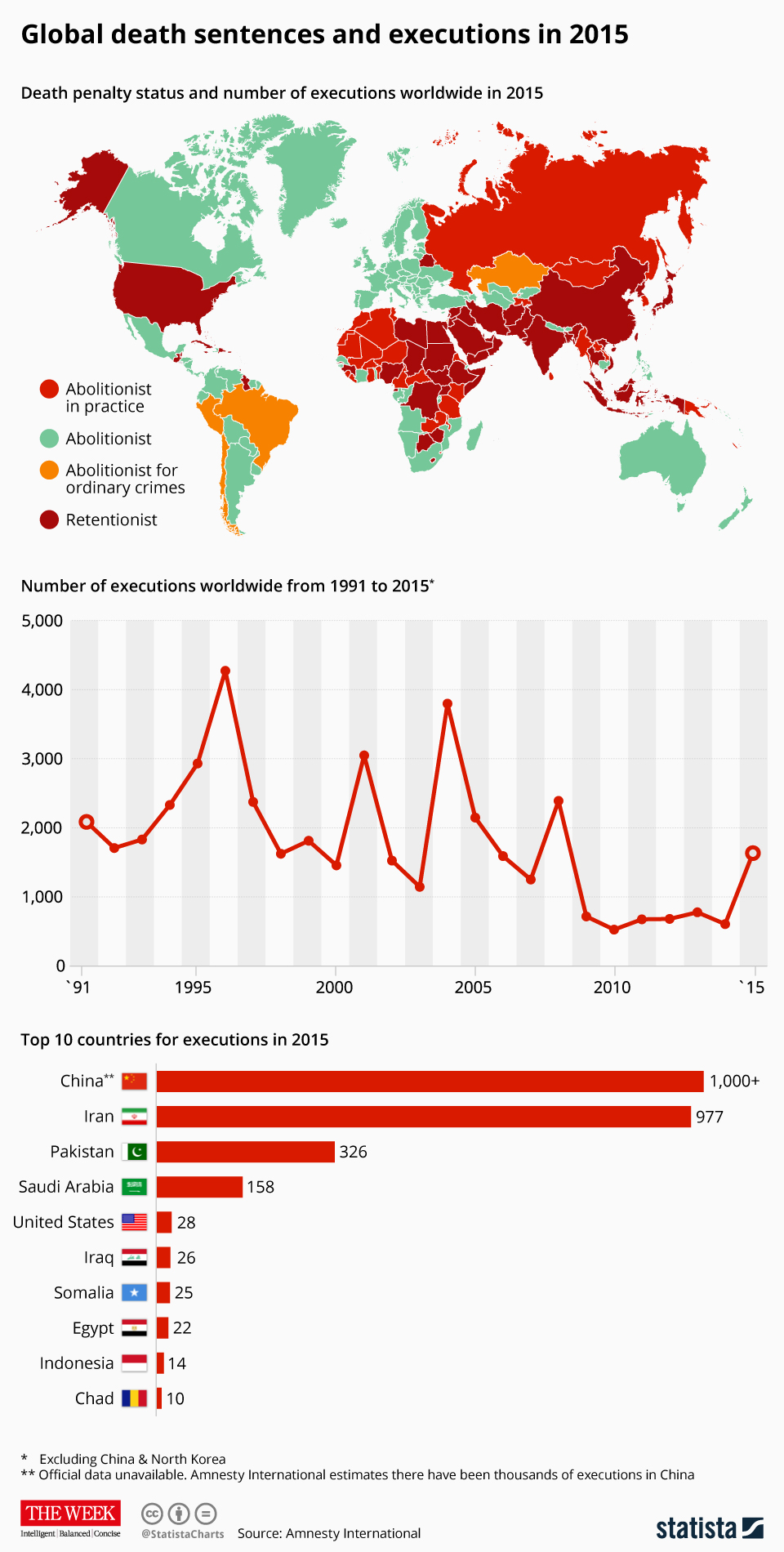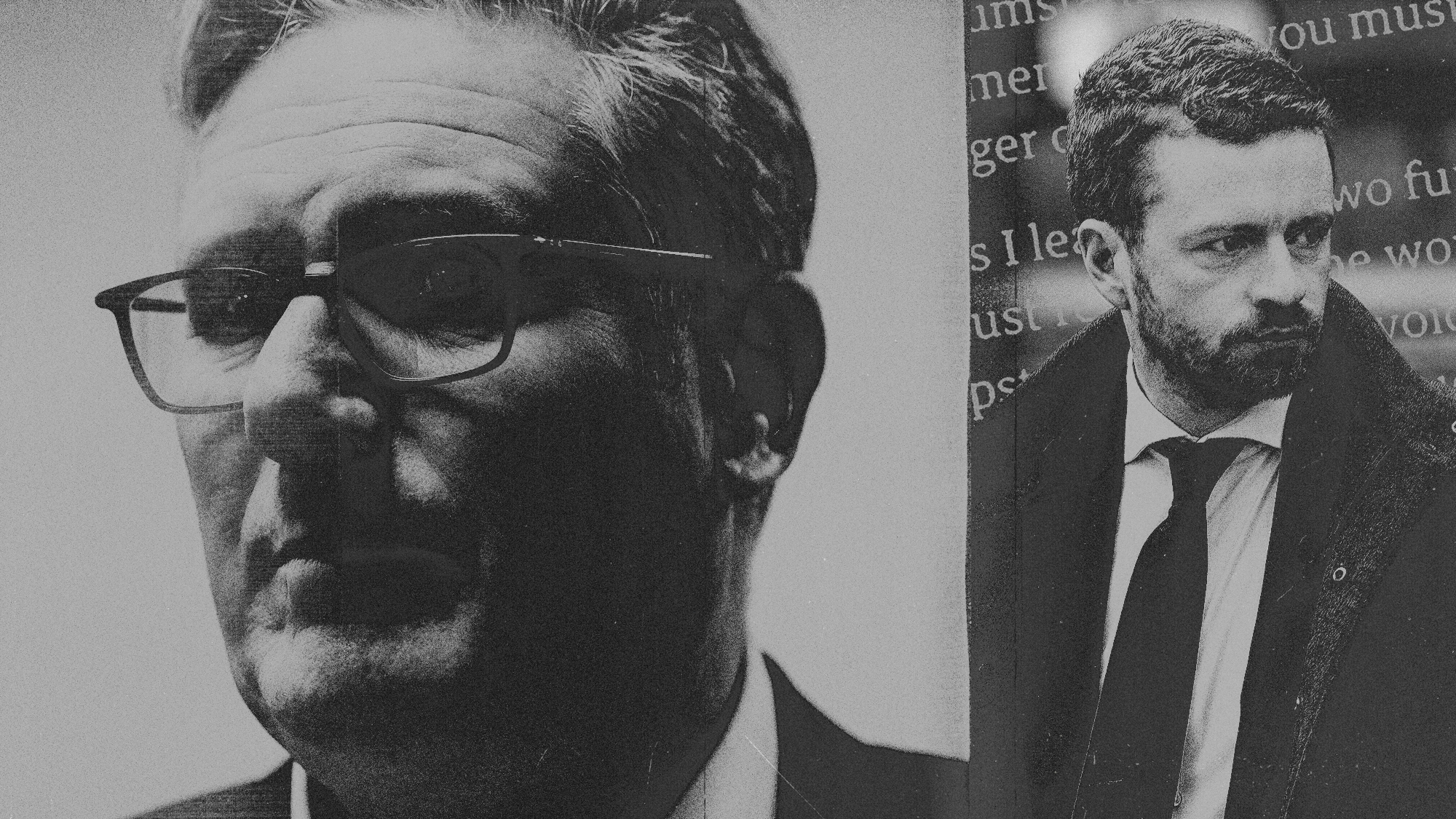Death penalty: Which countries execute the most people?
Iran tops official tally but secretive China is thought to be responsible for many more deaths

A free daily email with the biggest news stories of the day – and the best features from TheWeek.com
You are now subscribed
Your newsletter sign-up was successful
On 10 October, the international community recognises World Day against the Death Penalty, which calls upon the 87 countries that retain capital punishment laws to repeal them.
In a joint statement released to mark the day, the Council of Europe and the European Union reaffirmed the EU's opposition to capital punishment, and urged Belarus – the only European nation to carry out executions – to abolish the death penalty.
Which countries still retain the death penalty?
The Week
Escape your echo chamber. Get the facts behind the news, plus analysis from multiple perspectives.

Sign up for The Week's Free Newsletters
From our morning news briefing to a weekly Good News Newsletter, get the best of The Week delivered directly to your inbox.
From our morning news briefing to a weekly Good News Newsletter, get the best of The Week delivered directly to your inbox.
There are 56 countries that carry out death sentences for a range of crimes, while another 31 nations still have capital punishment laws on the books, but do not execute anyone in practice.
So far, 102 countries have abolished the death penalty, most recently Fiji, Republic of the Congo, Madagascar and Suriname, while another six only retain it for exceptional crimes such as treason.
Which countries sentence the most people to death?
China is believed to be the world's leading practitioner of the death penalty. Precise figures are impossible to obtain because they are kept secret by the government, but Amnesty International estimates the annual number of executions to be in the thousands.
A free daily email with the biggest news stories of the day – and the best features from TheWeek.com
Iran has the highest number of officially publicised executions. In the first six months of this year, it put 242 people to death. However, if that rate remains consistent, Iran is on track to massively reduce the number of executions from last year, when it executed 977 people for offences ranging from drug smuggling to homosexuality.

In all, upwards of 2,500 people are believed to have been executed around the world last year.
What is the status of the death penalty in the UK?
Capital punishment for ordinary crimes was abolished in 1965 in Great Britain and in 1973 in Northern Ireland, although treason remained punishable by death until 1998. The last people to be executed in the UK were Peter Anthony Allen and Gwynne Owen Evans, both hanged in 1964 for the murder of John Alan West.
There has been no serious move to reintroduce capital punishment since its abolition. However, last year's British Social Attitudes Survey suggested that 48 per cent of Brits continue to believe the death penalty is a suitable punishment for a limited range of crimes.
Why do people support the death penalty?
Those in favour of capital punishment argue that some crimes are so heinous that execution is the appropriate response.
In Japan, where a few executions take place every year and more than 80 per cent of people are in favour of the death penalty, there is a unique justification for the practice, the BBC reports. In a society where many "live under severe stress and pressure in the workplace", the death penalty demonstrates that evil-doers will be punished. More importantly, it reassures the average person that their good behaviour will be rewarded.
Those against the death penalty argue that it is an archaic and inhumane way to punish wrongdoing.
Amnesty International describes capital punishment as "cruel, inhuman and degrading", criticising not only the act of execution itself, but the long drawn-out waiting time on death row faced by many prisoners condemned to death.
There are also doubts about its efficacy as a deterrent, despite pro-death penalty activists' claims that executing the worst criminals could deter others from following a similar path.
Studies investigating the link have produced inconclusive results, although a 2009 survey of criminologists found that 88 per cent did not believe the death penalty acted as a deterrent.
Infographic by www.statista.com for TheWeek.co.uk.
-
 Political cartoons for February 9
Political cartoons for February 9Cartoons Monday's political cartoons include 100% of the 1%, vanishing jobs, and Trump in the Twilight Zone
-
 Who is Starmer without McSweeney?
Who is Starmer without McSweeney?Today’s Big Question Now he has lost his ‘punch bag’ for Labour’s recent failings, the prime minister is in ‘full-blown survival mode’
-
 Hotel Sacher Wien: Vienna’s grandest hotel is fit for royalty
Hotel Sacher Wien: Vienna’s grandest hotel is fit for royaltyThe Week Recommends The five-star birthplace of the famous Sachertorte chocolate cake is celebrating its 150th anniversary
-
 Epstein files topple law CEO, roil UK government
Epstein files topple law CEO, roil UK governmentSpeed Read Peter Mandelson, Britain’s former ambassador to the US, is caught up in the scandal
-
 Iran and US prepare to meet after skirmishes
Iran and US prepare to meet after skirmishesSpeed Read The incident comes amid heightened tensions in the Middle East
-
 Israel retrieves final hostage’s body from Gaza
Israel retrieves final hostage’s body from GazaSpeed Read The 24-year-old police officer was killed during the initial Hamas attack
-
 China’s Xi targets top general in growing purge
China’s Xi targets top general in growing purgeSpeed Read Zhang Youxia is being investigated over ‘grave violations’ of the law
-
 Panama and Canada are negotiating over a crucial copper mine
Panama and Canada are negotiating over a crucial copper mineIn the Spotlight Panama is set to make a final decision on the mine this summer
-
 Why Greenland’s natural resources are nearly impossible to mine
Why Greenland’s natural resources are nearly impossible to mineThe Explainer The country’s natural landscape makes the task extremely difficult
-
 Iran cuts internet as protests escalate
Iran cuts internet as protests escalateSpeed Reada Government buildings across the country have been set on fire
-
 US nabs ‘shadow’ tanker claimed by Russia
US nabs ‘shadow’ tanker claimed by RussiaSpeed Read The ship was one of two vessels seized by the US military